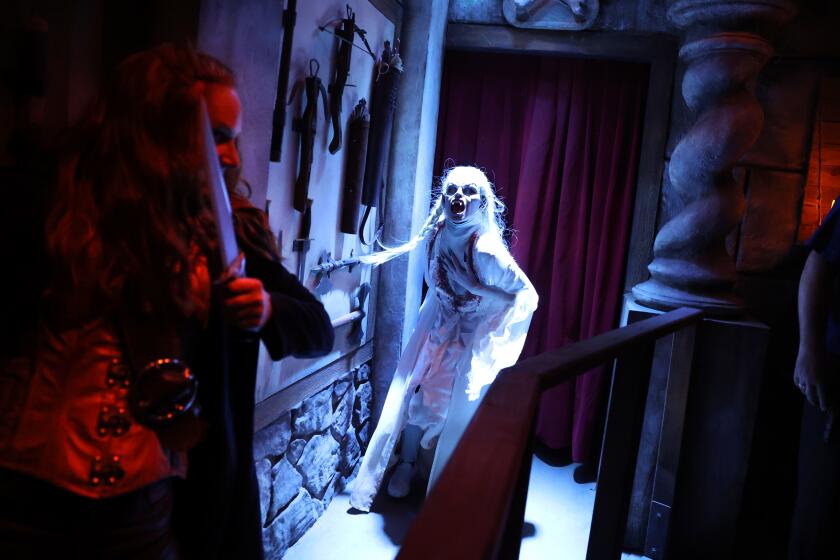Pioneer Life on Rugged Trek Puts Teen-Agers Back on Right Track
Pulling a handcart through the Rocky Mountains in a rainstorm was no lark for 15-year-old Zanetta Van Zyverdent, a participant in a “Pioneer Trek” for teen-agers.
But she wouldn’t have traded the four-day experience for a year’s supply of free pizza.
“It was hard work, but it made me feel good about what I could accomplish. The experience was a turning point in my life,” said Zanetta, now 16, as she recalled the adventure.
The modern-day pioneer experience is designed to give teen-agers an appreciation for what the Mormon pioneers experienced on their 1,200-mile trek west. Each summer nine groups of 200 young people spend four days traveling over 25 miles of rugged mountain trails in Utah’s Wasatch National Forest.
For some participants, the impact can be profound. Zanetta was one of those people.
“That was a year ago, when I was going through hard knocks with my family,” she said. “I was always the rebellious one, battling with my mom, doing poorly in school. My goal in life was to become an alcoholic. I’d laugh about it. Life was ups and downs, but mostly downs. A lot of the time, I didn’t want to live.
Unity Emphasized
“I look back now and think maybe it was my fault. On the trek, family unity is emphasized. My ‘ma’ in our pioneer family told me to hug my mom and tell her how much I love her when I got home. I told her ‘no way,’ but when I got home I gave mom a hug, and it was the start of getting along. Now we’re real close.”
The groups are divided into “families” of about 16 people, with adult leaders as the “parents.” Each family is given a handcart to pull, just as the pioneers did.
“That first night, we pushed and pulled our handcart from noon to midnight on mountain trails, everyone pulling together,” Zanetta remembers. “The last mile was uphill, and we started running when we pulled into camp because we wanted to get there so bad.”
The would-be pioneers had broth the first night, typical pioneer fare, and cornmeal mush the next morning.
“The food was really gross, but we ate it because we were so hungry,” Zanetta says.
The next day the families pulled the carts to basic camp, where they would learn to shoot a black powder gun, make candles and play pioneer games. For dinner, there would be freshly roasted turkey. But someone had to catch it first.
‘Turkey Catcher’
“I was chosen to be the turkey catcher for our family,” says Zanetta. “I caught it with help from my family, then we had to kill it, pluck it, and put it in a pit to cook it. I didn’t want to do that, but we needed the food. I cried because we killed it. But then we cooked it with sage, and it was really good.”
There’s more to the Pioneer Trek than catching your own food and pulling a handcart, though, says 19-year-old Heidi Moffat, assistant director of the program sponsored by the educational system of the Church of Jesus Christ of Latter-day Saints. She works part time in the program while she is a student at Brigham Young University.
“The experience changes people and helps them build self-esteem,” says Heidi, who first went on Pioneer Trek when she was 14. “The kids see themselves accomplishing hard tasks, and learn confidence. They also learn to appreciate friends and family more.”
Adds Zanetta, “In the pioneer families, you stick together with total strangers, and grow close. We depended on each other, and I learned from that.”
Each participant was assigned to go blindfolded a short distance from camp and bring back five objects: something hard, soft, dead, alive and yellow. They would typically bring back flowers, twigs and rocks.
“We had to rely on our leaders’ directions to get out safely, and trust them,” says Zanetta. “After I got back, the leaders asked if I would help the others come back safely, even though I was still blindfolded. Something happened to me at that point. My life had been chaotic, and I was surprised to find a new calmness. I found something in myself I didn’t know was there.
“I’ve done a lot of growing outside of Pioneer Trek, but it was the beginning of feeling good about myself,” says Zanetta. “My grades are good, and I’ve cleaned up my life. I still have problems, but I’ve made some good decisions about my life. I learned some important things on the trek.”
Sign up for The Wild
We’ll help you find the best places to hike, bike and run, as well as the perfect silent spots for meditation and yoga.
You may occasionally receive promotional content from the Los Angeles Times.



